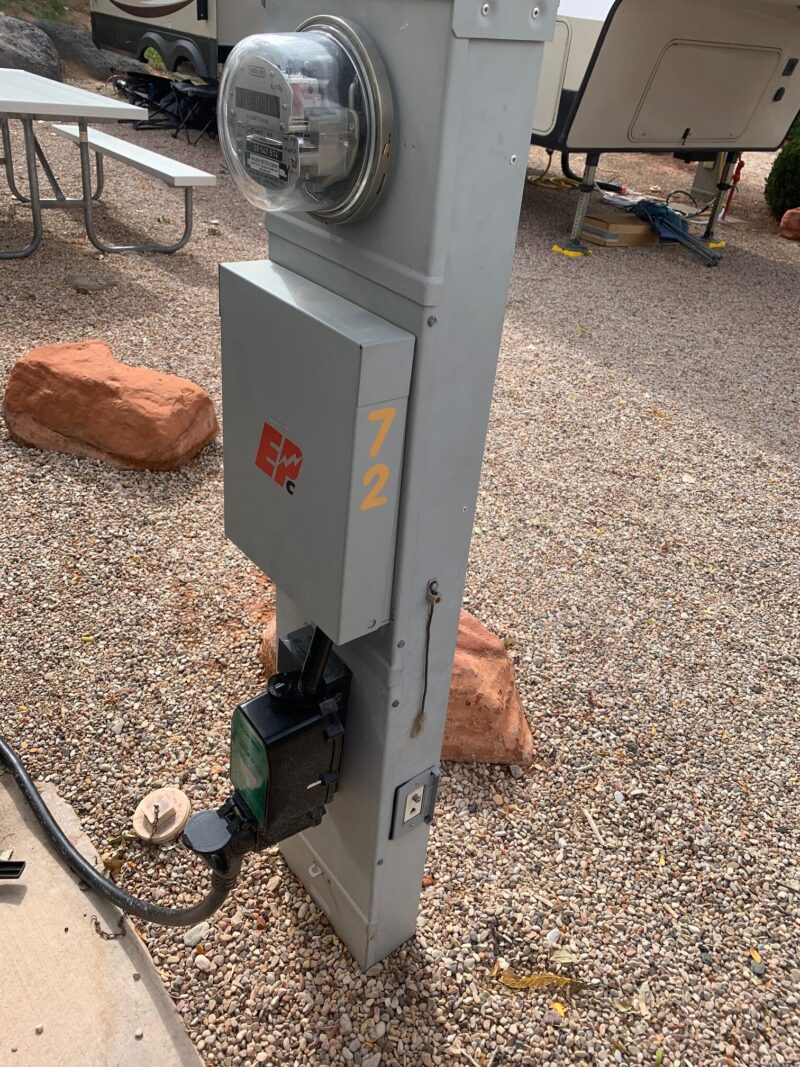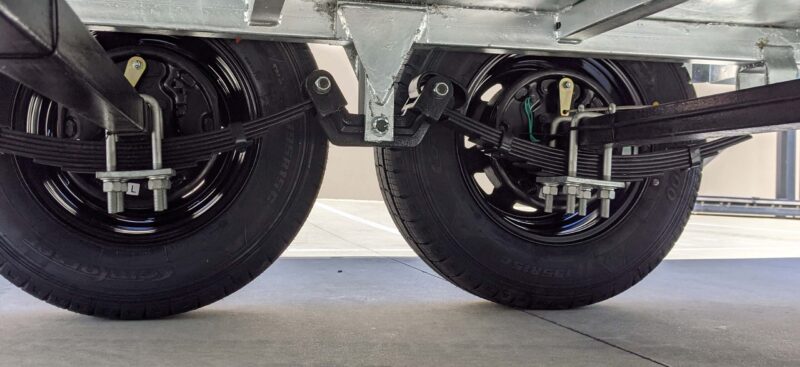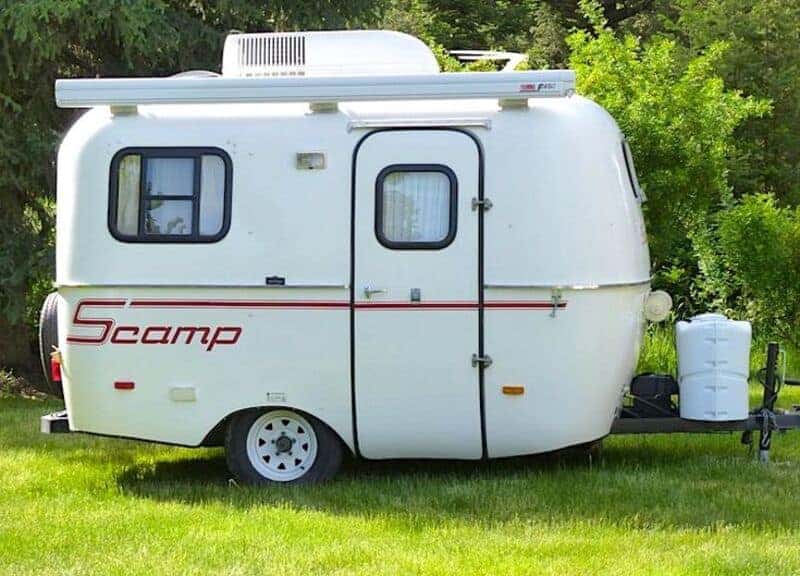A member of our private Facebook Group, RV Camping for Newbies, asked an interesting question: Who is liable for a power surge at a campground?
They said a campground power surge damaged their RV, and their RV insurance company said the campground’s insurance company should pay for the damages.
Have you experienced an RV power surge at a campground? If you have an RV surge protector, you probably didn’t think twice about the experience. If you did not have a surge protector, your electronic equipment and possibly your motor coach may have been damaged.
A power surge can cause a tripped circuit breaker, a sudden resetting of devices, power loss, and broken electronics. Faulty wiring or possibly a lightning strike can also be a cause.
Who is liable for damage to your RV or electronics? The campground? The power company? You? If you have insurance and your campground has insurance, one or the other will likely pay for damages.
Read on for more about when the power surges in a campground.
What is a Power Surge?
When the flow of electricity is interrupted, then started again, or when something sends electricity flowing back into the system, a power surge occurs. Surges can range from just a few volts of electricity to thousands of volts from a lightning strike.
Voltage drops can also have negative effects such as equipment malfunction or meltdown, power consumption, and possible damage to electronics and electrical systems.
What Causes RV Power Surges?
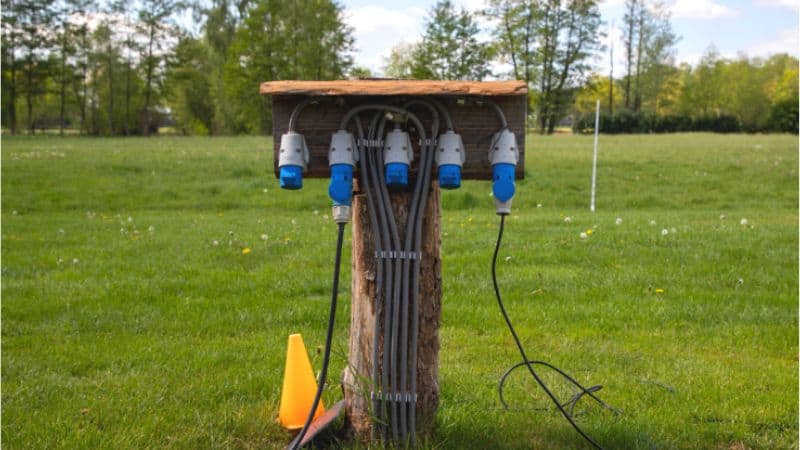
If you are hanging out at the campground on a clear day and you have a power surge, it could be the campground has electrical issues. Poor wiring, faulty breakers, or over-taxed electrical systems can all cause problems. Restoration of power after an outage can also cause a “surge.”
Lightning strikes, fallen trees, and other environmental causes could also cause your power to surge.
Here are just a few things that can cause your power to surge at a campground.
- Bad or faulty wiring
- Tree limbs that are touching power lines
- Animals getting into a transformer
- Damaged circuit breakers
- Restoration of power after a blackout
- Lightning strikes
What are the Signs of a Power Surge?
There are a few signs that might indicate you have experienced a power surge. Tripped breakers are a telltale sign but so are flickering lights or surges on your RV fans, flashing lights on electrical devices, or a burnt smell near electronic devices.
Once you have had a power surge, reset, unplug, and repower all your electronic devices before resetting your circuit breakers if a power outage occurs after the surge. Inspect your electronics, power outlets, and any appliances that are run on electricity and assess for damage.
Can A Power Surge Damage Your RV?
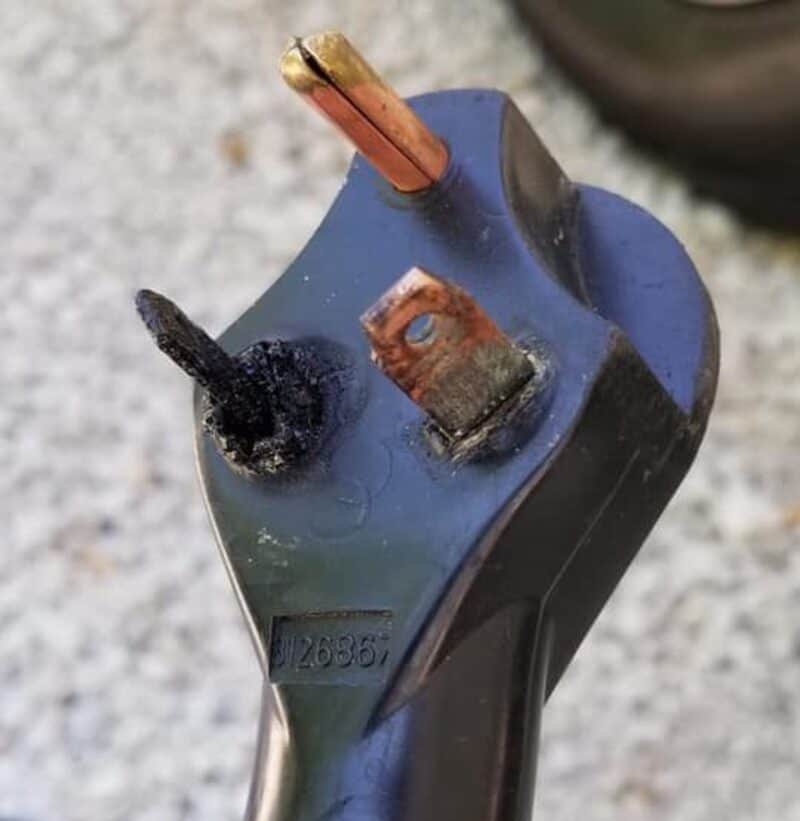
Yes, a power surge can damage your RV. A power surge is one of the main causes of electrical damage to an RV. Think about all the electrical items that you have in your RV.
A power surge can damage appliances such as refrigerators, microwaves, air conditioners, inverters, and other vital RV items, costing thousands of dollars to replace.
The electronic appliances and devices in your RV are only designed to handle a certain voltage. If the amount of power is exceeded, it can damage these items and keep you off the road. To make matters worse, a power surge can also cause a fire. It only takes one surge to do a lot of damage.
A voltage drop, although not as likely, can also damage electrical items that are running at the time.
Are Campgrounds Liable for Power Surges?
In most cases, campgrounds do their best to ensure the safety of everyone and every RV during their stay. It is not likely that the campground will be found liable for a power surge. However, if the campground is negligent or does something that causes a power surge, it could be found responsible.
Most likely, your insurance company will cover the damage. You need to take precautions and make sure that your first line of defense is a surge protector. A few hundred dollars spent now could save you thousands of dollars later.
Ways To Avoid a Power Surge
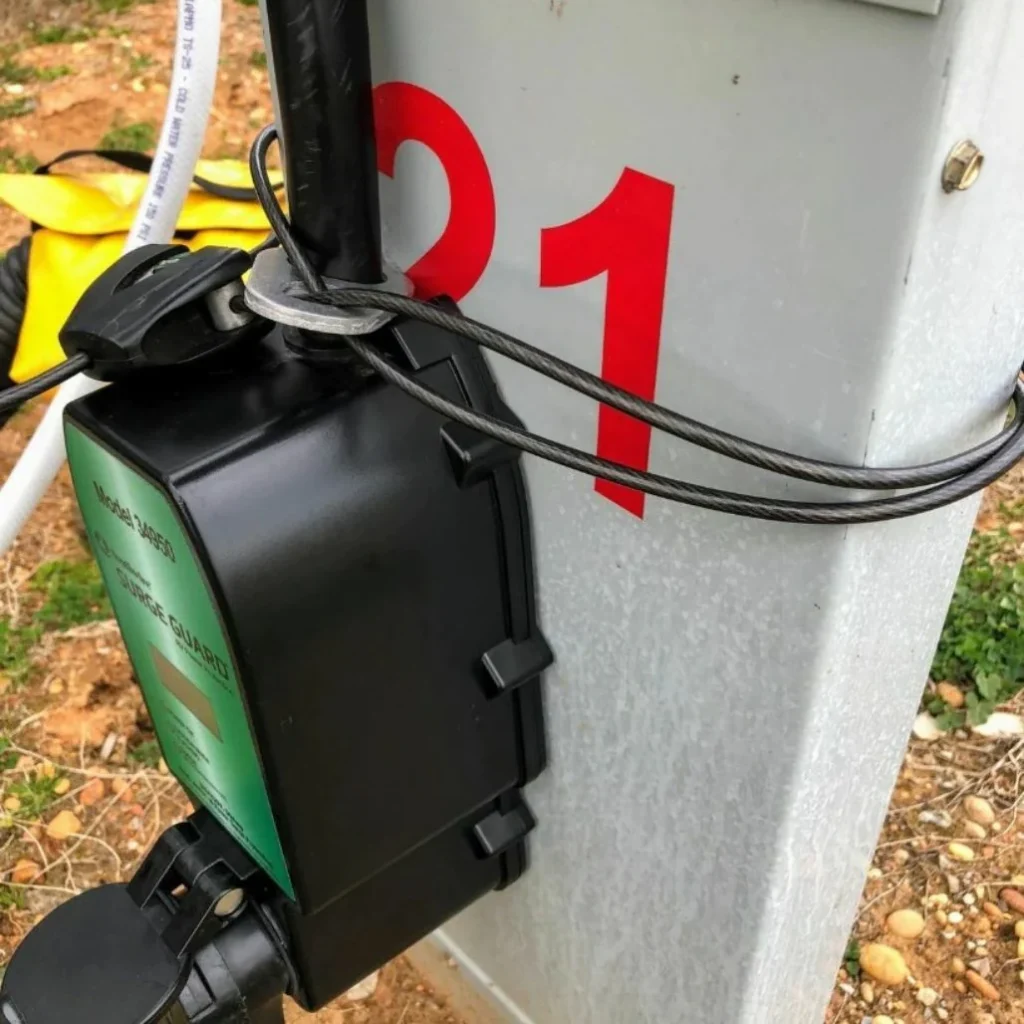
The only way to be sure your RV is protected from a power surge is to use a surge protector.
While there are countless types of surge protectors, the one that will keep you and your electrical systems safe in your RV is the one that plugs into the power hook-up at your campground site. It provides a barrier between the campground’s power and your RV.
Because surge protectors are external they are at risk for both damage and theft. You can easily lock these to the power post and ensure they work correctly every time you hook up.
Some surge protectors on the market mount inside your vehicle. While these avoid some of the issues listed, they can be more difficult to install and can sometimes produce heat.
Be power conscious, and don’t overstrain your RV’s electrical system. Consistently running multiple appliances, can blow breakers and wear out your system over time.
You can also unplug your RV if you develop electrical issues.
How Does an RV Surge Protector Work?
An RV surge protector serves as a buffer between the power source and your RV. A good one is designed to cut power at a certain voltage. A standard surge protector only protects against spikes.
EMS (electronic management system) surge protectors regulate voltage by not allowing power into your RV if it’s out of the acceptable range. This means voltage spikes, as well as voltage drops, are prevented.
An EMS can be incorporated into your electrical safety protocol. While the surge protector will help neutralize the surge damage, an EMS will shield your RV from one.
Most surge protectors will have an EMS built-in or you can install them separately.
Depending on the brand of surge protector, you should have indicator lights that will tell you if the device is running properly or if there are problems at the pole. Make sure you check with the manufacturer’s instructions to know what each light means on your particular model.
It is also important to know that the level of protection provided by an RV surge protector is listed in joules, a standard international unit of measurement. The higher the joule rating the better.
The joule rating is the amount of energy it can absorb before it fails. Your surge protector should have at least the recommended 2,000 joules of protection.
How to Use an RV Surge Protector
Here are a few steps to help you correctly use your RV surge protector.
Choose the right product for your RV. In a world that is screaming at you to buy this or buy that, make sure you choose a surge protector that is compatible with your RV’s electrical system and offers the amount of protection you need.
You will find basic products and those with additional features. You may not need the most expensive product to get the protection you need. Always use a surge protector that has the same amperage as your RV. If your RV has a 30-amp system, use a 30-amp surge protector.
Connect the surge protector to your RV. Most surge protectors are designed to plug directly into the electrical pedestal at the RV park or campground. Plug in the surge protector and then plug your RV’s power cord into the surge protector.
Check the LED indicators. LED indicators provide information on the status of the device, such as whether it is properly grounded, whether it is providing surge protection, and whether it is detecting any voltage irregularities. Read your owner’s manual to help you interpret the indicator lights.
Monitor the surge protector. Throughout your stay, keep an eye on the LED indicators to make sure the device is functioning properly. Be alert for any signs of issues or power surges. If you notice any problems, disconnect the RV from the device and call an electrician.
Final Thoughts About Power Surges in RVs
There are few things more important in your RV gear bag than an RV surge protector. Without one, your RV is vulnerable to damage from a power surge. Make sure you purchase a quality surge protector and that you are using it correctly.
While it may seem like a large expense, a surge protector can save you thousands of dollars if the electronic equipment in your RV is damaged. The peace of mind that you have from knowing your belongings are protected is worth every penny.
Related Reading:
– 17 Essential Spare RV Parts To Carry
– 10 Most Common Travel Trailer Repairs And How To Avoid Them
– Space Heaters For Campers: Are They Safe?
– Should I Add A Second Battery To My Camper?
About the Author:
Terri Nighswonger and her husband Todd have been RVing and work camping for five years with their Cavalier King Charles Spaniel, Newton, and their Minnie Australian Shepherd, Remi.
They originate from the Midwest but plan to enjoy the West for a few years, wintering in Arizona and summering wherever the road may lead. Writing is Terri’s passion, but she also loves hiking, kayaking, walking her dogs, and anything she can do outdoors.


